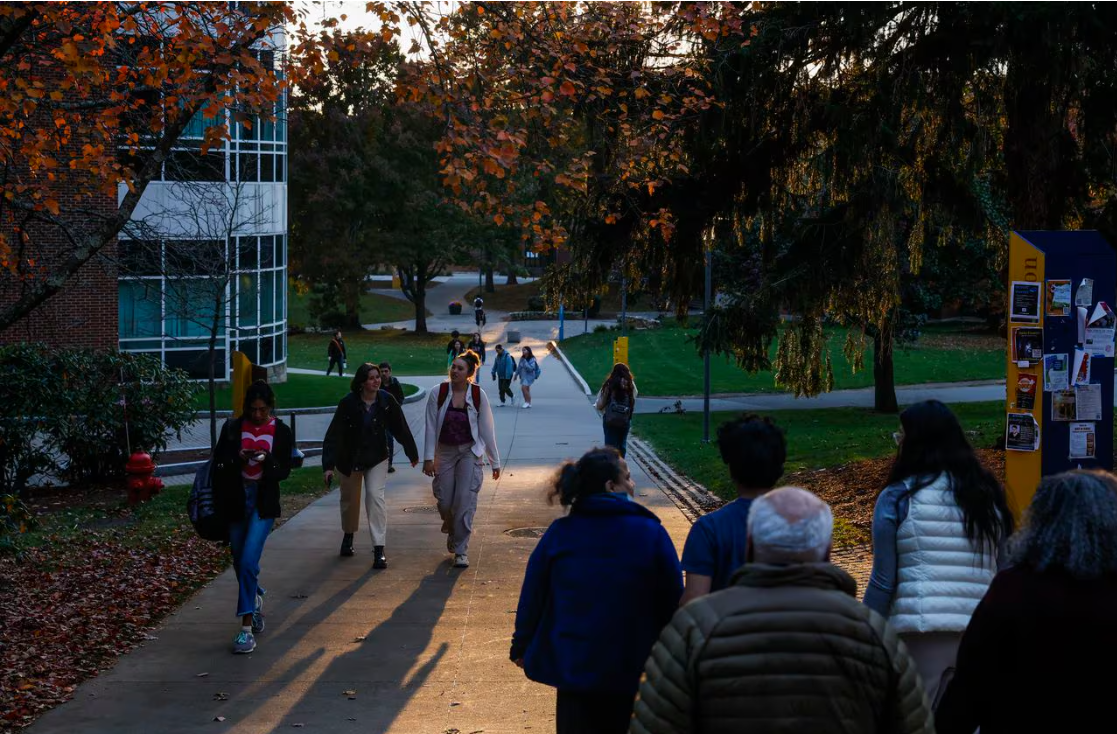“令人震惊”:报告发现,四分之一的年轻人计划在未来五年内离开大波士顿

【中美创新时报2023年3月13日波士顿讯】(记者温友平编译)在大流行促使马萨诸塞州居民逃往其他通常更便宜的地方之后,一份新报告警告说,该州面临着失去更多命脉的风险:年轻人。《波士顿环球报》记者达纳·格伯(Dana Gerber)对此作了如下报道。
大波士顿商会基金会周一发布的一项调查发现,由于租金、工作成本高昂,20岁至30岁的大波士顿居民中有25%计划在未来五年内离开该地区,这一比例“令人震惊”。 可用性和购买房屋的能力是他们决定留下或离开的最重要变量。
这些发现呼应了新冠疫情时代的担忧,即大波士顿地区天文数字的住房成本,加上广泛的混合和远程工作场所带来的地理灵活性,将削弱该地区的年轻人才。
“我们的年轻居民不仅是劳动力的未来,也是我们小企业、市中心和工作场所的现任领导者和捍卫者,”商会主席詹姆斯·E·鲁尼(James E. Rooney)在与调查同时发布的一份声明中表示。 “我们有责任提高年轻居民的声音,他们为我们当地的活力和公民结构做出了贡献,同时克服了重大障碍。”
诚然,20 多岁的年轻人早已从波士顿来来往往。 年轻人经常来到该地区参加学术课程,然后离开去寻找工作,甚至在疫情爆发之前,领导人就曾哀叹这种“人才外流”现象。
但总部位于华盛顿特区的研究公司 HIT Strategies 在 11 月和 12 月进行的 GBCCF 研究指出,当代的挑战导致确保该地区能够为子孙后代提供生存的“高度紧迫性”。
房租成本和工作机会是年轻人决定是否留在这里的“非常重要”因素(66%),而有能力买房的人则为 55%。(在年轻人希望当地领导人优先考虑的问题上,经济适用房也排名最高,为 66%。)在受访者中,42% 的人表示租用自己的住宅,18% 的人表示自己拥有住宅,27% 的人免费与亲戚住在一起。
年轻人权衡是否在这里建立生活的其他考虑因素包括高效的公共交通和流动性(41%)、与家人的距离(40%)、儿童保育的负担能力和可用性(38%)以及种族和文化多样性( 36%)。
但离开的愿望分布并不均匀。 黑人女性和 LGBTQ 人群更有可能考虑离开大波士顿(分别为 35% 和 31%),而亚裔美国人和太平洋岛民(77%)和千禧一代女性(76%)更有可能计划留下来。
话虽如此,大多数受访者都喜欢住在这里。 绝大多数人(89%)表示对大波士顿地区的日常生活感到非常或有些满意。
除了普遍存在的经济问题外,报告还谈到了该地区社会机会的作用,计划离开大波士顿的人中有 39% 表示他们“难以建立社区”。 22% 的受访者表示在该地区建立社区很困难,在改善社会景观的方法中,更多的娱乐选择(例如夜生活或节日)、雇主优先考虑工作/生活平衡以及更好的交通和流动性位居榜首。
题图:2023 年 11 月 7 日,人们走过位于沃尔瑟姆的布兰迪斯大学校园。ERIN CLARK/GLOBE STAFF
附英文原文报道:
‘Alarming’: One in four young people plans to leave Greater Boston in the next five years, report finds
By Dana Gerber Globe Staff,Updated March 12, 2024
In the aftermath of the pandemic prompting Massachusetts residents to decamp for other, often cheaper locales, a new report warns that the state is at risk of losing even more of its lifeblood: young adults.
A survey released Monday by the Greater Boston Chamber of Commerce Foundation found that an “alarming” 25 percent of Greater Boston residents between the ages of 20 and 30 plan to leave the region in the next five years, with the high cost of rent, job availability, and the ability to buy a home clocking in as the most important variables in their decision to stay or go.
The findings echo COVID-era concerns that the astronomical cost of housing in Greater Boston, coupled with the geographic flexibility introduced by widespread hybrid and remote workplaces, will sap the region of its young talent.
“Our young residents are not only the future of the workforce, but also our current leaders and champions of our small businesses, downtowns, and workplaces,” said Chamber of Commerce president James E. Rooney, in a statement released alongside the survey. “It is incumbent upon us to elevate the voices of young residents who are contributing to our local vibrancy and civic fabric while navigating significant hurdles.”
To be sure, 20-somethings have long come and gone from Boston. Young people often arrive in the area for academic programs and then leave to find work, a “brain drain” leaders lamented even before the pandemic.
But the GBCCF study, conducted in November and December by Washington, D.C.-based research company HIT Strategies, pointed to contemporary challenges that contribute to a “heightened urgency” around ensuring the region is viable for future generations.
The cost of rent and the availability of jobs tied for “very important” factors for young people deciding whether or not to stay here, at 66 percent, with the ability to buy a home trailing at 55 percent. (Affordable housing also ranked the highest, at 66 percent, for issues young people want local leaders to prioritize.) Among those surveyed, 42 percent reported renting their residence, 18 percent said they owned, and 27 percent lived with relatives for free.
Other considerations for young people weighing whether or not to build a life here include efficient public transportation and mobility (41 percent), proximity to family (40 percent), affordability and availability of child care (38 percent), and racial and cultural diversity (36 percent).
But the desire to leave is not distributed evenly. Black women and LGBTQ people were more likely to be thinking about leaving Greater Boston (35 percent and 31 percent, respectively), while Asian American and Pacific Islanders (77 percent) and millennial women (76 percent) were more likely to plan on staying.
All that said, most survey respondents like living here. An overwhelming share — 89 percent — reported feeling very or somewhat satisfied with their day-to-day lives in Greater Boston.
In addition to the prevailing economic concerns, the report also touched on the role of social opportunities in the region, with 39 percent of those who plan to leave Greater Boston saying they had “difficulty building community.” Among the 22 percent of respondents who said building community in the region was difficult, more entertainment options such as nightlife or festivals, employers prioritizing work/life balance, and better transportation and mobility topped the list for ways to improve the social landscape.

